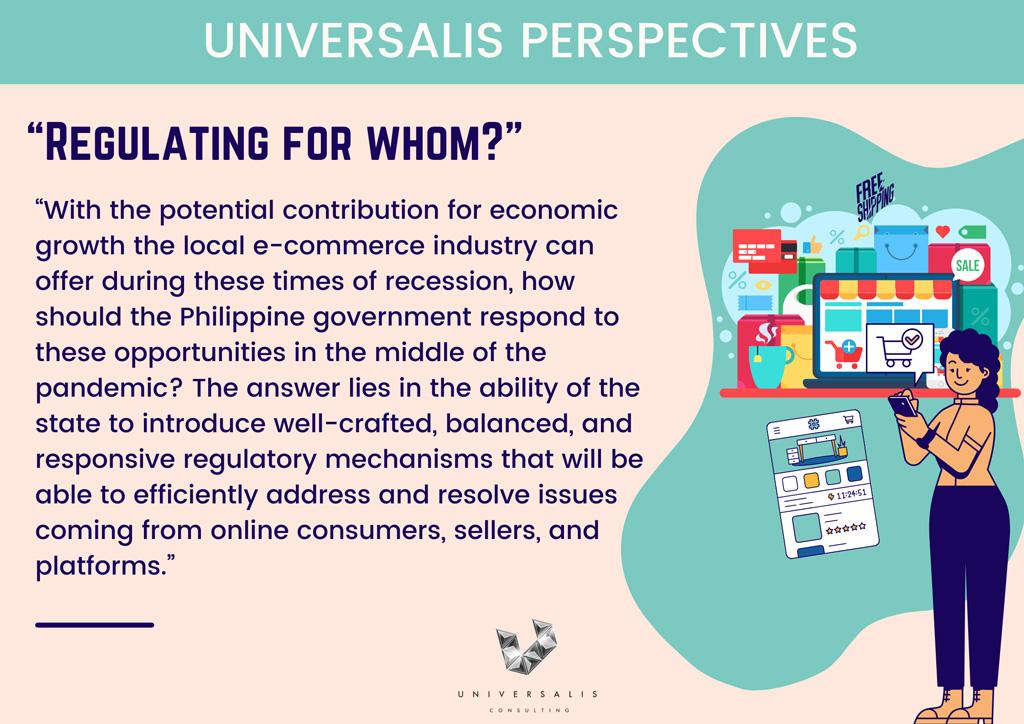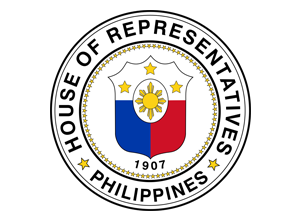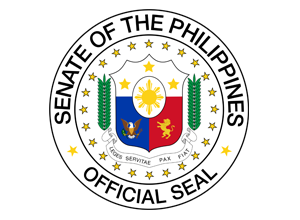Universalis Perspectives: Regulating for whom?
As the pandemic required people to reduce their external errands, most economic activities are forced to shift their transactions via online modes. The sudden transfer of businesses to the virtual world presented various opportunities to online shopping platforms ranging from mobile applications such as Shoppee and Lazada and up to informal online sellers present in social media, especially in Facebook.
While mobility restrictions severely inflicted industries such as retail, restaurants, leisure and travel, e-commerce was observed to grow as one of the important pillars sustaining the Philippine economy during this pandemic. For instance, Shopback Philippines recorded a 376% growth in their sales in the first half of 2020. In addition, Google Philippines predicted that the local electronic commerce industry of the Philippines will grow up to US$ 28 billion by the end of 2025. With the potential contribution for economic growth the local e-commerce industry can offer during these times of recession, how should the Philippine government respond to these opportunities in the middle of the pandemic? The answer lies in the ability of the state to introduce well-crafted, balanced, and responsive regulatory mechanisms that will be able to efficiently address and resolve issues coming from online consumers, sellers, and platforms.

Typically, businesses tend to frequently view government regulations in a negative light. Most entrepreneurs view them as constraints in the expansion, innovation, and profit-making of businesses. However, the anarchy and versatility offered by cyberspace to every individual enabled the space to be abused by ill-willed persons and groups performing scam, fraud, and other criminal-related activities. The presence of these bad elements in the cyberworld negatively impacts not only the individual buyers, sellers, and platforms but also the Philippine e-commerce industry in the macro-level; thus, further providing the justification why the Philippine government is compelled to institutionalize a regulatory mechanism to monitor and police online business transactions. However, what should be the institutional blueprint required for the government to efficiently resolve the needs and issues of its e-commerce industry?
First, the regulatory mechanism must be well-crafted. Regulation must properly identify governmental offices where aggrieved parties can resort to. The functions and responsibilities of these offices must be properly delineated to ensure that confusion and overlapping of performance of duties shall be prevented.
Second, regulation must be also balanced. Regulatory policy must be inclusive enough to provide protections towards online buyers, sellers, and platforms. While the police power of the state pushes governments to address grievances towards individual victims, it is necessary to assert that culpability towards a cybercrime is not only confined to fraudulent sellers but also to consumers who are interested to take advantage of redeeming incentives provided by online platforms to the victimized buyers. This mechanism is prone to abuse. While there are no available official statistics about this matter, this reality is echoed when the Department of Trade and Industry, last December 2020, appealed to the public to record and store texts messages and calls from bogus buyers. In addition, this scenario is not only innate in the Philippines but also a worldwide trend. For instance, based on the data from Apriss and National Retail Foundation, Signifyd reported that online shopping platforms in the US are losing US$18 billion per year due to return fraud claims of abusive online buyers. Equal protection and due process should be available to online buyers, sellers, and platforms to prevent discouraging the entrance of new entrepreneurial initiatives.
Lastly, regulatory mechanisms should exhibit responsiveness. In a globalized world, local industries are not operating in a vacuum. They are situated in a complex web of commercial relationships and ties inside and outside the Philippines. Therefore, the Philippine government must ensure that the contents of the regulatory policy are also aligned and synchronized to the on-going regional and international developments particularly in terms of economic integration such as the objectives of the ASEAN Economic Community to establish a single market for the Southeast Asian region in 2025, and the implementation of new trade mechanisms by the recently-concluded Regional Comprehensive Economic Partnership. If the Philippines shall contribute to and benefit from the realization of these regional objectives, it must play its part in ensuring the protection of businesses from unscrupulous and abusive consumers present in the region’s e-commerce industry.
Given the circumstances that increasing number of businesses are currently flocking to e-commerce as part of their adaptation to the new normal, a regulatory policy that accounts the interests of online buyers, sellers, and platforms must indeed be in place. A well-crafted, balanced, and responsive regulatory policy will ensure that a stable business environment for e-commerce operations is existing in the Philippines. Banking on this situation, the Philippine government is expected to reap the benefits of investing and cultivating the economic potential offered by the digital market sector. Aside from providing a grievance mechanism for online buyers, online platforms and sellers are also ensured with confidence and sense of security that they will not be taken advantage of. As a result, local entrepreneurial activities and foreign firms may be more attracted to operate in the Philippines which can assist the country’s economic recovery through investments and annual income taxes. In addition, another ancillary benefit provided by these e-commerce firms is the creation of local jobs that will engage in the online business transactions of these platforms. Thus, higher employment rate in the local populace also means an increased percentage of annual tax revenues. Through these benefits, the government will be able to continuously finance its economic recovery programs. As the Philippines positions itself in the anticipated post-pandemic global economy, the country needs to appreciate latching on the chances and opportunities presented by a world continuously adapting to a new normal scenario.


